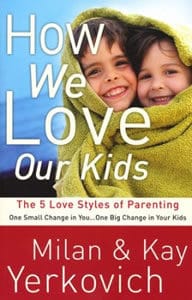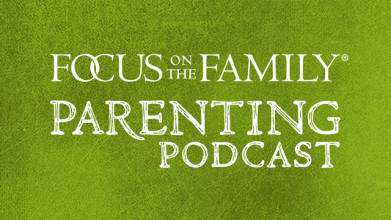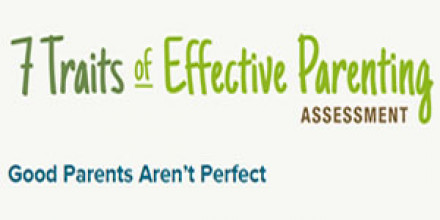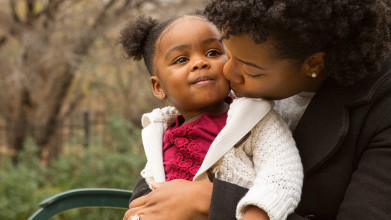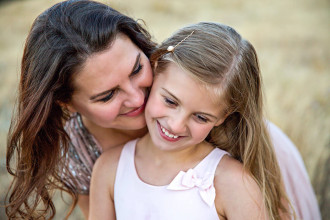Excerpt:
Kay Yerkovich: When you become a secure connector, you’re gonna be able to really emotionally engage with your kids. Their feelings aren’t gonna overwhelm you. You’re going to be able to help them learn what to do with those difficult emotions that we all face. You’ll be able to say no.
End of Excerpt
John Fuller: Well, that’s the kind of relationship you want, right? Every parent wants that. To interact with your children in healthy, loving ways instead of with frustration and conflict and stress. That’s encouragement from Kay Yerkovich who, along with her husband Milan, has developed a profound way of understanding how we relate to each other, uh, both in marriage and in parenting, and how we can learn to be more emotionally healthy in those relationships. And the Yerkovich’s are our guests today on Focus on the Family. Your host is Focus president and author Jim Daly, and I’m John Fuller.
Jim Daly: John, one of our primary goals here at Focus is to help strengthen and support families. I hope that’s obvious. That’s what we do day in and day out, on this broadcast, our website, our counseling team, and with all the resources that we’ve highlighted through the years. Uh, that’s why, uh, we want to highlight the Yerkovich’s and their Love Styles concept again today. Many of our listeners are familiar with the Love Styles, and Milan and Kay have been among our most popular guests because so many of you have found this concept to be transformative in your relationship with your spouse. But it also works with your children, and a few years ago, we recorded a great conversation with Milan and Kay about their book, How We Love Our Kids: The Five Love Styles of Parenting. This is good stuff, and it helped Jean and I with our boys, and John, I’m sure you and Dena found it helpful as well.
John: It really is so good. We keep referring to it as, uh, time goes on, and that’s why we’re coming back to this. It’s really wonderful content. We recommend you check out the Yerkovich’s book and, uh, the many other resources we have for you and your family at focusonthefamily.com/broadcast. Now, Milan and Kay Yerkovich are counselors, authors, radio hosts, and speakers, and Jim, here’s how you started the conversation with them on today’s episode of Focus on the Family.
Jim: Welcome back to the program.
Kay: Oh, thanks for having us.
Milan Yerkovich: We’re excited to be here.
Jim: Hey, before we talk about those styles, the Love Styles of parenting-
Milan: Mm-hm.
Jim: … what’s the purpose of parenting? When you look at it-
Milan: [inaudible 00:02:30].
Jim: … and strip it all away, what am I trying to do as a dad or a mom?
Kay: I think we’re trying to help children have an amazing picture of who God is.
Jim: Ah.
Kay: Uh, you know, as parents, we are the first taste a child has of what someone is like who’s bigger than me. Um, what’s an authority like? What’s a comforter like? And I think if we really invest in our parenting, we’re giving our children an amazing picture of who God is.
Milan: I think the goal of parenting is to teach our children how to regulate their mind, will, and emotions.
Jim: That sounds a lot harder. (laughs)
Kay: (laughs)
Milan: I know it is! But think about it for a second. You know, a baby cries. A mom and a dad gives comfort. The child finds relief. It happens thousands of times in the first year of life, second year of life, all the way through the formative years. The child expresses needs. The parents meet that need. And the child feels some comfort. And what it does is it teaches the child to be able to regulate, be able to delay gratification, to be able to self soothe-
Jim: Trust.
Milan: … to be able to trust others, like-
Jim: Mm-hmm.
Kay: Yeah.
Milan: … the, the authority figures and go to somebody when I’m in trouble, as well as to be able to control my impulses, and so the parent… We don’t think of this, but a parent really is a regulator of the child who, in turn then, is able to regulate themselves.
Jim: Well, let’s, um, talk about those styles, uh, within our children. We mentioned them, of course, in the program we did on marriage, but, uh, put them now into the parenting context. What are the five styles?
Kay: Well, we’re gonna talk about the Avoider, the Pleaser, the Vacillator, and the Controller, and the Victim. And I was the avoidant parent coming into m- motherhood.
Jim: Mm-hm.
Kay: And of course I didn’t know that for the first 15 years, but I grew up in a home that dismissed emotions and that, uh, taught me that I, if I had a feeling I was to not show it. If I cried, I was to go to my room and figure it out on my own. And so, without realizing it, in my early parenting, when my kids cried, I told ’em, “You’re fine.” And i- it was, you know, not an opportunity to go in and comfort, and sometimes, of course, that’s an appropriate thing to say, but it was what I always said.
Jim: Right.
Kay: And so, I really didn’t see emotions as something to develop and something to help a child name and to help a child regulate. I saw emotions as something to get rid of.
Jim: Yes. So that’s the Avoider. What are the others?
Milan: Well, you have the Pleaser, the Vacillator, and the Controller and Victim. I was the Pleaser parent, and so I was distressed by my child’s distress.
Jim: Huh, that-
Milan: If my child was agitated, I’d get agitated, then I’d need to fix that as quickly as possible, and so, uh, I would try to make them happy or divert them or be funny or have fun. Why? Because I didn’t, like Kay, w- want them to be in negative emotions because those negative or difficult emotions would stress me, so instead of empathizing with them, instead of listening to them, I would want to fix them quickly and make it all go away.
Jim: So, we’ve talked Avoider, Pleaser. Vacillator is the next one. Talk about that Vacillator parent.
Kay: Okay.
Jim: What, what do they look like?
Kay: Well, the Vacillator parent’s probably one of the most idealistic parents. They come into parenting really wanting to be the best parent that ever existed, and they wanna have the best kids, uh, that are an amazing reflection on them-
Jim: (laughs)
Milan: (laughs)
Kay: … and so, of course, kids don’t always quite follow that plan, do they? So, for the Vacillator, they really like intense connection they can feel, so they really like the baby stage a lot. Because that kid is really just so-
Jim: Totally dependent.
Kay: … oh, and, and, and endearing and adoring of them.
Jim: You can cut their hair any way. You can dress them any way.
Kay: Anything!
Milan: (laughs)
Kay: Right, right!
Jim: You’ve got total control.
Kay: Control.
Milan: They adore you no matter what you do.
Jim: Yeah, right. (laughs)
Kay: Right. And so, for the Vacillator parent, the twos and the teens are really hard, because that’s when a child says, “No,” “I don’t like you,” “I don’t wanna do what you say,” and the Vacillator often takes this as rejection, and so the Vacillator parent is sort of in and out. They are preoccupied often, so they can be great parents when they’re really, truly, fully present, but there’s many times, too, where they’re preoccupied, they’re mulling something over, and they’re not present for their kids.
Jim: So, it sounds like they’re either hot or cold.
Kay: Yeah. They’re in, they’re out. They’re hot, they’re cold.
Milan: One of the things they have, if I might add, is the reason that they’re idealistic and the reason that they want their child to perform well is they have a shame factor, where, if they’re embarrassed or they feel like they don’t look good, the child is not making them look good, they get very embarrassed, humiliated, and then that is really a big factor to them, and so they wanna then correct the child or correct the, the place where that child did that. Um, school, the teacher, the, the sports team. Shame’s a very big piece of the Vacillator’s soul.
Jim: I jus- I jumped immediately to Little League.
Kay: Oh, yeah.
Jim: I mean how, how many Vacillator parents are there in Little League?
Milan: (laughs)
Jim: “Come on, Umpire!” you know?
Milan: Yeah.
Kay: Exactly. They’re the ones that are gonna yell at the umpire.
Jim: Correct
Milan: I, I said to a lady the other day at a, at a Little League game. She was just raggin’ the umpire, and I said, “Do you know him?”
Jim: (laughs)
Milan: She says, “No.” I said, “The way you’re talkin’ to him, I thought maybe you knew him or somethin’.” She said, “Do you think I shouldn’t be saying this?” I said, “Look, if was the umpire, you’d be my worst nightmare!” And I said this to this lady, I- because she was really ragging on this guy. I’m not a Pleaser anymore, so yeah, I can say things like that.
Jim: (laughs) [crosstalk 00:08:05].
Kay: (laughs)
Milan: I can say things like that now. And she stopped, and she goes, “Oh, well maybe I shouldn’t do that.” And it just, uh, one of those moments where you’re absolutely right.
Jim: Yeah.
Milan: “That wasn’t the right call, so I’m going to call it.”
Jim: (laughs) So that’s Avoider, Pleaser, Vacillator.
Milan: Mm-hmm.
Jim: Talk about Controller parent. That sounds obvious, but what, what are the adjectives that describe the controller parent?
Kay: Well, the Controller parent grew up in a home where they were controlled. There’s trauma in the history of this parent, and so, when they become a parent, it’s very hard for them to identify with a baby and a toddler and a little kid and really f- remember what was it like to be a kid? Because they’ve survived by cutting it off, forgetting it, and never, ever again do I think about the past. So, you know, little kids are a bundle of feelings and needs, and this was something that the Controller, in his own home growing up, or her own home, these needs were not met.
Jim: Ah.
Kay: So, it’s very difficult for the Controller parent, coming from trauma, to have any skills in their own parenting, and they’re constantly triggered by their kids’ crying and neediness.
Jim: In fact, in your book How We Love Our Kids, you even said, uh, the Controller parent is an aggressive taker. Uh, that, that’s an interesting description. What is aggressive taker? What are they doing?
Kay: Well, for the Controller, the aggression is about, “You have to stay in my box, and then I can relax.” Uh, when you look at the history of the Controller, there was no box. It was a chaotic home. Anything went. I mean, there was trauma, and so the Controller controls to try and prevent that feeling of being out of control that they had growing up. So, the aggression is about keeping someone in the moment, within a place where they feel not threatened.
Jim: Ah. Y- so often, as we describe these, and there’s a couple more we’ll get to in a second, but uh, children, it’s almost like this pendulum effect. And I don’t know if that’s the Lord’s way of keeping balance, but when parents have certain attributes that are negative, kids tend to have the opposite response to that when they grow up. Is that fair? I mean it doesn’t happen every time.
Kay: Yeah. I think it can kinda go either way. You know, if you had a really angry parent, you might say, “Well, I’m gonna be a really kind parent,” but interestingly enough, what we often find is that, when that child, especially at the twos when they’re difficult, you know, those things in your history are gonna come back out. I’ve had so many little moms from preschoolers come up to me and say, “I’m trying so hard to be, you know, a parent who’s not angry, but I have to admit I feel rage,” and my next question is, “Was your childhood difficult?” And they always say, “Yes!”
Jim: Yeah.
Kay: And so, it’s like it sneaks in there.
Jim: Interesting.
Kay: It’s just hard to control.
Jim: Hmm. Okay, let’s… uh, we hit Avoider, Pleaser, Vacillator, Controller. Talk Victim.
Milan: Well, the victims come out of homes where they have learned to tolerate the intolerable. They’ve been hurt. They’ve been wounded. And so, they’ve learned to live in, in circumstances that are absolutely, um, untenable, but they’ve learned to live there.
Jim: Yeah.
Milan: And so, what happens is they walk into adulthood or teenage years and they continue to live there. “I’ve been taken advantage of my whole life. Well, th- nothing’s new. You want to take advantage of me? Well, everybody else has. You want to push me around, tell me what to do? Well, that’s all I know how to do.” And so, victims typically don’t have a strong voice. They don’t know how to say no. They don’t know how to put up an arm and say, “You. Stop. Back up. Move away.” They can’t do that.
Jim: Oh.
Milan: And so, assertiveness is really missing on their part, so what happens is is they’re re-victimized over and over and over throughout life, and it’s really a tragedy. In our office, a lot of times what we do is we try and teach these people assertiveness training and how to say no and how to have the ability to hold up a hand and say, “Don’t come any closer.” And that’s a part of the process of learning to stop the madness of being abused.
John: That’s Milan Yerkovich describing how our different love styles affect the ways we think and feel and behave. And, uh, Milan and his wife Kay are our guests today on Focus on the Family, and we’re talking about their book, How We Love Our Kids: The Five Love Styles of Parenting. And I’d certainly recommend you get a copy of that at focusonthefamily.com/broadcast. And now more from our conversation with the Yerkovich’s on Focus on the Family.
Jim: And then lastly, as we talk about Avoider, Pleaser, Vacillator, Controller, Victim… We’ve covered a lot of ground there for the discussion. The place we wanna be is Secure Connector. Uh, describe that.
Kay: Well, the Secure Connector is raised in a home where, uh, they learn to take their pain and their difficult emotions into relationship. There’s a wide range of emotions. Every motion is okay, and they’re taught to manage those emotions appropriately as they grow up. So, when you become a Secure Connector, you’re gonna be able to really emotionally engage with your kids. Their feelings aren’t gonna overwhelm you. You’re going to be able to help them learn what to do with those difficult emotions that we all face. You’ll be able to say “no.” It’s not gonna be a feeling of, like, “Well, I can’t say no, or my kids won’t like me,” uh, so a secure parent brings a lot into the relationship. They’re coming from a place of strength as a parent. And they’re taking the skills that they’ve learned into their parenting. You know, the Bible says a pupil can’t really rise above the teacher, and so what we had to do was we had to change ourselves as parents. Uh, instead of changing our kids, we really had to look at ourselves and say, “Where are we lacking the secure connection,” these traits. “Where do we need to grow up to be better parents?”
Jim: Well, and what you’re saying very clearly is it starts with the parents.
Kay: Absolutely.
Jim: And you don’t blame it on your children-
Kay: Right.
Jim: … if you’re seeing behavior issues there, you can probably-
Kay: Look at yourself first.
Jim: Look at yourself and your parenting style, and you’ll probably find some answers there.
Kay: Absolutely.
Jim: Even though r- rightfully… I mean, kids, like all of us. We’re born with independence at some point. But that’s manageable.
Kay: Right.
Jim: Is that what you’re saying?
Kay: That is what I’m saying.
Jim: Okay. Let me give you an example. Maybe you can determine for me… This literally just happened this morning. So, um, I go to the pantry. I find four empty boxes in the pantry, right?
Kay: (laughs)
Jim: A cereal box, a Triscuit box, a protein bar box, and I took them out, and I kinda put them on the floor, and then the boys eventually woke up, and I said to the boys, “Whoever took the last one out of each of these boxes, I want you to throw it away.” Well, it turned into this whole discussion. “You don’t have to get so angry, Dad,” and I’m going-
Milan: (laughs)
Jim: … “No, I’m saying this very plainly. I just want you to throw the box away ’cause I’m not the pantry cleaner-
Milan: (laughs)
Jim: … and if you’ve taken the last item out of the box, throw the box away,” and I mean it literally… it lit this whole discussion about… and I- I’m finally saying, “Guys, it’s not about how I’m asking you to get it done. I’m tellin’ ya you’re not doing your fair share if you’re takin’ the last item out of the box and leaving it in the pantry.” “Nope. There you go. You’re getting angry again.”
Milan: Oh.
Jim: I’m going, “You guys, you’re not, you’re not hearing me!”
Milan: And, “Oh, by the way, you could have already done it-
Jim: Right!
Milan: … and- if you hadn’t argued with me.”
Jim: It turned into this big debate! I’m going, “Just throw the box away.” And Troy particularly was just really… He really wanted to go with me on this and fight me on it.
Kay: How old is Troy?
Jim: He’s 13.
Kay: Oh, well. See-
Jim: Yeah. There we go.
Kay: I thought… I was gonna guess. I think you got some teenagers in your house.
Jim: (laughs) But what, what’s happening in that dynamic? Why aren’t they getting it? Uh-
Milan: Why aren’t they listening to you?
Jim: Yeah. (laughs) What’s happening there?
Milan: Why don’t teenagers just listen to us?
Jim: Yeah.
Milan: Teenagers don’t listen because they are on the cusp of coming from childhood into adulthood, and their brains are undergoing this massive transformation where they are actually pruning circuitry in their brain and laying down new pathways, which makes ’em very squirrelly. It’s like construction projects on the freeway. So, they’re challenging to work with. What I challenge parents to do, and what we, we encourage all parents to do when we get into the teenage years, is lessen the amount of rules in the house and work it down to three things, which your illustration clearly brings up. Number one, I want my teenagers to re- know what respect is. I want them to know what it means to be responsible. And I want to them to know what it means to be productive. Now the empty boxes have to do with all of those.
Jim: (laughs) It does!
Milan: You see? I, I, I’m not respecting the household. You see, uh, and I’m not being respectful to the rest of the people in the house. I’m not being responsible if I ate this last one to throw it away and maybe put it on the Costco list, you know? And I’m not being productive to figure out how to make this home work. These are the three things I want teenagers to get to know and then personally absorb as, as values, rather than having tons of rules. So, they get the larger concepts.
Jim: Yeah. Y- You know, another thing that, that comes to mind is you can come from brokenness, you know, you can come from pain, and one of these, um, attachment issues we’re talking about, but that doesn’t give you the right to be a bad parent.
Kay: Well-
Jim: I mean sometimes we can make an excuse. Rather than grow in Christ, we, we, we-
Kay: That’s right.
Jim: … leave ourselves there. “This is how I am.”
Kay: Well, I think the best thing we can do is be a growing parent. Because we can’t be a perfect parent. But I do want my kids to say, five years from now, no matter how old I am, “My mom is different than she was five years ago,” and I want them to be able to observe growth in me. Now I have a thought about your son. Kids that are in the adolescent years love to point out what they think are the weaknesses in their parents-
Jim: [crosstalk 00:18:10].
Kay: … and they’re usually a little bit accurate.
Jim: Oh, absolutely!
Kay: Okay?
Jim: Okay, here we go.
Milan: (laughs)
Kay: So-
Jim: [crosstalk 00:18:15] ahead.
Kay: So what you could say is, “I would love to have a discussion with you about how you think I’m angry and, you know, what kind of things do I do that make you feel like that and how do you feel when I’m angry, as soon as you throw the box away that you emptied. But, you know, you keep bringing up, ‘Dad, you’re mad.’ ‘Dad, you’re mad.’ I think we should have a talk about that,” so that you’re inviting them to give you feedback, um, about your own behavior, and I think what that does is that if we work on our behavior while we’re asking their kids to wor- our kids to work on theirs, I think they’re more receptive.
Milan: Yeah. I- If I said to my son, “How- What would have been a better way to address you on this topic? I, I came in. I’m frustrated. Let me tell you how I’m feeling. I come in. I’m looking for cereal, Triscuts, and protein bars, ’cause that’s what I have every morning for breakfast-
Jim: (laughs) Triscuits just fell out.
Milan: … just, just, just pretending. I just love Triscuits, man. Okay. So, “I’m looking for… How would you like me to have shared that with you?”
Jim: Right. (laughs)
Milan: Because I’m asking, “So what do I do that bugs you?” You know? Maybe Trent says, “Dad, the fir- that’s the first thing that came outta your mouth. I would have loved to have heard, ‘Good morning.’” You see?
Jim: That’s probably true, actually.
Milan: (laughs)
Kay: (laughs)
Jim: [inaudible 00:19:29].
Milan: So, so, so, you see, and, and, and so we have to ask them, “What do I make you feel like when you’re around me?”
Jim: Hm.
Milan: And, and we did that with our teenagers, and asking them, “What do you, what’s it like to be around me?”
Jim: Okay, I ‘fessed up. You give me one of your own stories.
Kay: Oh, gosh!
Milan: (laughs)
Kay: We have so many!
Jim: Give it to me.
Kay: Well, I can think of… You know, I almost had the opposite problem, um, when my son became a teenager and got testy like that, I found myself just being almost speechless.
Jim: Now you’re the Avoider parent.
Kay: I’m the Avoider parent, and, uh, you know, but when I looked at my own history, my dad was pretty testy and, and he could get angry, and up to this point in this kid’s life, he’d just been this happy kid, and now all of a sudden he’s turning into this angry kid-
Milan: Monster.
Kay: … that can, that can boss me around.
Milan: A, a man.
Kay: A man, really!
Jim: (laughs)
Kay: And so-
Milan: Big man.
Kay: … I had an interesting growth journey there. I, I thought, “Wh- what’s happening here? Why, wh-, why did I, why am I losing my voice?” And I realized, “Oh my gosh! This is reminding me of my dad.”
Jim: Huh.
Kay: And I never had a voice around my dad. So one of the ways I… I went to my son, and I said, “I’m having a hard time saying stop to you when you’re really getting out of line,” and I said, “I, I just figured out it has to do with my dad,” and I said, “I never had a voice around my dad,” so I said, “I’m gonna be working on it, but I want you to know it’s not right, where I’m at.” So I think we have to be aware as parents, especially when w- our kids are adolescent, “Where are my weaknesses?” Because they’re gonna tell ya. So, you might as well own up to ’em and have open discussions, like, “You know, I, I’m, I’m gonna work on this. This isn’t a good quality as a parent. You need a parent that can say, ‘That’s enough.’”
Jim: Yeah. How, how do I determine m- my children’s style? I mean we’ve described them, but how, how can I look at my kids and say, “Okay, they’re a Vacillator. They’re a Pleaser. They’re an Avoider.”
Milan: Mm-hmm.
Kay: It’s a great question.
Milan: Mm-hmm. I think the, um, Avoider child is going to not ever want to tell you how they really feel. They’re not gonna wanna go to vulnerable feelings, negative feelings. Except for anger. They’ll go to anger. But they are never going to ask or inquire or reveal their real feelings underneath what’s going on inside.
Jim: When would you see this? About what age do these patterns begin to form?
Milan: Oh, I think they can, you can see them as early as four and five and six years old and on into adolescence, in childhood and adolescence. It’s a pattern of never addressing negative feelings and emotions-
Jim: Yeah.
Milan: … and that’s why we must learn, as parents, to observe what is our child’s stress response?
Jim: Right.
Milan: What do they do when they’re stressed?
Jim: Mm-hmm.
Milan: Every time my avoidant child is stressed, they withdraw, for instance. They’ll go to their room. They’ll also, uh, go start fixing things, doing homework, and the whole house could be this wild place, but they’ve just shut down and closed off, and they’re not participating in this home anymore. Uh, I might go ask them, “Are you stressed right now?” or, “Is this home atmosphere stressing you?” And I think we must observe and then b- as parents, we have to inquire and say, “Okay. I think you’re stressed. I’m the parent. I’m observing you. Every time you’re stressed, you withdraw, so I want you to give me three feeling words off the feeling word list and tell me what’s going on on the inside, and then I’ll leave you alone.”
Jim: Huh. And that’s the Avoider child?
Milan: That’s the Avoider child.
Jim: He-
Milan: I wanna get them to access and start act- you know, retrieving and learning these feelings. Now that’s not to be confused with the introverted child, who needs to recharge their batteries through withdrawal, Kay was both, so I, uh, as, maritally, I had the Avoider and the introvert who would withdraw for various reasons.
Kay: Mm-hmm (affirmative).
Milan: So, it’s important to find out… and we outlined this in our book How We Love Our Kids, the introverted child is not the same as the avoidant child.
Jim: Right.
Kay: But either way you gotta pursue them. Either way.
Jim: Pursue.
Milan: Correct.
Kay: You have to pursue the Avoider. You have to pursue the, the introvert. They’re not just gonna tell you.
Jim: Ah. And, and I think what we need to do, for people to, to look at that list, we’ll put a link on the website-
Milan: Mm-hmm.
Jim: … and they can go look at the various lists. Because that’s a good reference tool. And the book, of course, has it.
Milan: Mm-hmm (affirmative).
Jim: So that’s a good place to start. How We Love Our Kids. We’ve only talked about that Avoider and their attributes, uh, let’s come back next time, talk about the others, and also some parenting techniques to help your child land in that secure attachment place, which again is the goal. You’ve been listening to Focus on the Family, Milan and Kay Yerkovich. Their book, How We Love Our Kids. Thanks so much for being with us. Let’s come back next time and keep diggin’.
Kay: Sounds great. Thank you.
John: I really like that recommendation from Kay about pursuing our kids. It gets busy in life, and we can sometimes let those relationships slide and, uh, forget how quickly our children are growing up.
Jim: Uh, you’re right. Uh, you never want to overlook the long-term relationship you’re building with your children. My boys are already on their way out of the nest, and Jean and I are so blessed that we have a really great relationship with them as young adults. It’s been fun to watch. Uh, we want the same thing for your family, and we have some wonderful resources for your parenting journey. Things like the Yerkovich’s book and our website. Uh, you’ll find a lot of encouragement there. We also have our free parenting assessment which is so good. It’s easy to fill out, and it gives you a wonderful overview of what’s working well in your family, as well as some suggestions about, um, ways to improve.
John: Yeah, I really like that parenting assessment, and, uh, you can learn more about that and the terrific book by Milan and Kay and other help when you call 800-A-FAMILY or stop by focusonthefamily.com/broadcast.
Jim: John, I am so thankful for the Focus Friends who faithfully support, um, our efforts to strengthen and save families together. Uh, without your financial giving, we wouldn’t be here to encourage struggling moms and dads. Uh, I’m reminded of a note we received recently from a listener we’ll call Michelle. She wrote this. “Your podcast came at the right time in my life. I’m a single mom of a soon-to-be 8-year-old daughter. Some mornings are pretty rough for us, uh, with me feeling overwhelmed and fussing at her. I tell her all the things she’s doing wrong, and I feel bad about it afterwards. She feels bad, too. Sometimes I feel like the worst parent on earth-
John: Hm.
Jim: … but your podcast is so helpful and inspiring, and I know you can help me do a better job in the future. It’s good to know I’m not the only parent who’s struggling. Thanks for all you do.” Uh, that is so encouraging to hear, John. That’s the goal. And again a big part of, uh, this thank you goes to you for your generous support of this family ministry. And with your continued giving, we’ll be able to help a lot more parents, uh, like Michelle in the days ahead. And I wanna invite you to become a monthly partner with us. Um, your monthly pledge helps us better plan and allocate resources for families in 2021. And working together, I know we can accomplish great things for God’s kingdom. So can we count on your support today?
John: I do hope so. And, uh, contact us about a monthly pledge or even a one-time gift. Anything that you can contribute today will be greatly appreciated. In fact, when you make a gift of any amount to Focus on the Family today, we’ll say thank you for joining the support team by sending a copy of the Yerkovich’s book, How We Love Our Kids. Donate and get that book when you call 800-A-FAMILY or stop by focusonthefamily.com/broadcast. And coming up next time, we’ll hear more practical parenting help from Milan and Kay.
Teaser:
Milan Yerkovich: And a lot of times, in, in our Christian homes, it’s about correcting the behavior and character and all that, and we don’t stop and ask what was driving that bus.











